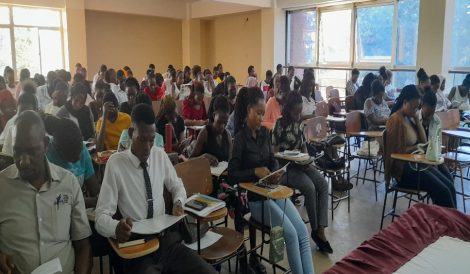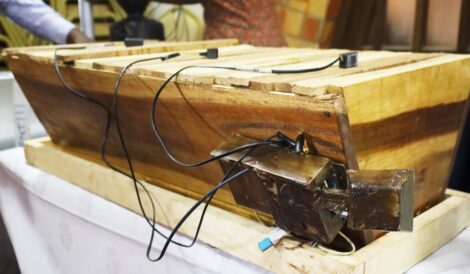Renowned Ugandan academic and international ICT consultant, Eng Dr. F. Francis Tusubira, has implored Makerere University to protect its reputation and lead the technological revolution and research in the country. Dr. Tusubira previously taught at the College of Computing and Information Sciences (CoCIS) for many years.
Tusubira delivered the keynote address during a public lecture organized by the College of Computing and Information Sciences on the theme, “The Future of Computing and Information Sciences/Services” 30th September 2022. The CoCIS Open Day, Public Lecture, and Alumni Dinner were organized by a committee spearheaded by the Grants Officer Ms. Dorah Bampangana and Dr. John Ngubiri as part of the activities to commemorate the 100 years of the university’s service to humanity.

Tusubira argued that technology is always neutral, inanimate, and incapable of determining anything for humans. Instead, it is humans that determine what technology can do for them. He decried the human tendency to resist change noting that although Makerere University had had an e-learning infrastructure for 18 years, the institution got shocked and paralyzed when the Covid-19 lockdown happened.
“Though Makerere eventually conducted some teaching and assessment online, now we have gone back to face-to-face education. How can Makerere transform society when it cannot transform itself? This ‘Ndiwulira’ attitude has to change! There is nothing like a ‘new normal. There is no normal; everything, life is transient. We have to adapt to survive.”
Tusubira advised university staff to embrace the digital transformation or else remain in past as ‘academic aristocrats’.
“Why can’t I study at Makerere from my village in Busembatia? You don’t have to hold a test tube; you can simulate it or the entire laboratory environment. I know academics still harbor the pride of imparting knowledge to learners like they are gods. If we don’t change the way we teach them, we are preparing our learners for the past, not for the future.
Technology is driven by our desires. In wartime, we use it to kill and destroy; in peacetime, we use it for leisure and construction. However, we have to beware that all technologies have unintended consequences,” he advised.
Tusubira stressed that globally, the application of Artificial Intelligence is the leading trend, followed by advanced connectivity. He challenged CoCIS to start teaching quantum computing which has advanced far in other countries. Although Tusubira acknowledged that Uganda or Makerere may not afford the hardware for quantum computing, there should be deliberate efforts towards having a national policy on it, theoretical training, and immersive virtual education.
Maintaining the value of humans

Tusubira said Ugandans must embrace the fourth industrial revolution with turbocharging research, Artificial Intelligence, the Internet of Things, Open research and utilize the power of simulation. He, however, warned that there must be a precaution to always value human beings, go back to ubuntu and “bring back the heart to humans”. There must be conscious resistance to singularity; i.e. the situation where machines with Artificial Intelligence replace human beings.
Tusubira contended that a few committed individuals can change the world, rather than waiting for a critical mass in vain. He advised the university to influence the government by impressing the politicians rather than begging them.
Dr. Tusubira told participants that historically it has been strong individuals that build strong institutions that propel society forward. He appealed to the university to consider updating curricula regularly.
“If the world is changing every six months, why should Makerere’s curriculum have to change every five years? We must accelerate the process of changing curricula. Let’s dare to be beginners [pioneers] and exploit all possibilities,” he urged.
He called upon CoCIS to look for its alumni and bring them back for interaction and engagement for a valuable and useful harvest.
The need for high-speed connectivity
Dr. Tusubira observed that Uganda needs more high-speed connectivity everywhere than the big roads adding that traffic jam in Kampala is worsened by having to take and pick up learners to school in the morning and evening,
He said the jam in Kampala is something that can be avoided or minimized with increased connectivity which would enhance and guarantee e-learning and boost work, as Ugandans would easily get outsourced deals. He expressed concern that India whose citizens speak and write poorer English than Ugandans dominates global business outsourcing.
“We need to disrupt education to match the evolving job markets. For example, Artificial Intelligence is now real and everywhere; and it is changing the job market. There are now high-speed diagnostics and telemedicine. Even court cases are being handled online. Banking has gone online and soon banking halls may be no more,” he stated adding that:

“People are now looking for jobs that don’t exist anymore. Yet, here, we are training people for the past, not the future! In Uganda, people are denying their children access to smartphones. It’s futile; all you need to do is warn them about the dangers online and train them on how to avoid or manage them without harm. But then, also, the parent or guardian should endeavor to be tech-savvy.”
Tusubira explained that although jobs are disappearing, work is increasing in volume globally, and therefore, people must adjust and learn to do one piece of work at a time, be able to work in multiple places, and get virtual deals (outsourcing) as the work presents itself.
Another trend Dr. Tusubira highlighted was that people no longer interview recruits with potential, that is, somebody who can grow; they are searching for someone who can do the work right away and can continually retool oneself. He called for opening up the minds of children to have wider horizons and be as multidisciplinary as possible from an early age.
Dr. Tusubira also said there is growing work and inevitable data growth. He however observed that there are no data analytics courses going on in Uganda imploring Makerere University to take lead.
Compiled by:
Jane Anyango
Principal Communication Officer, CoCIS



